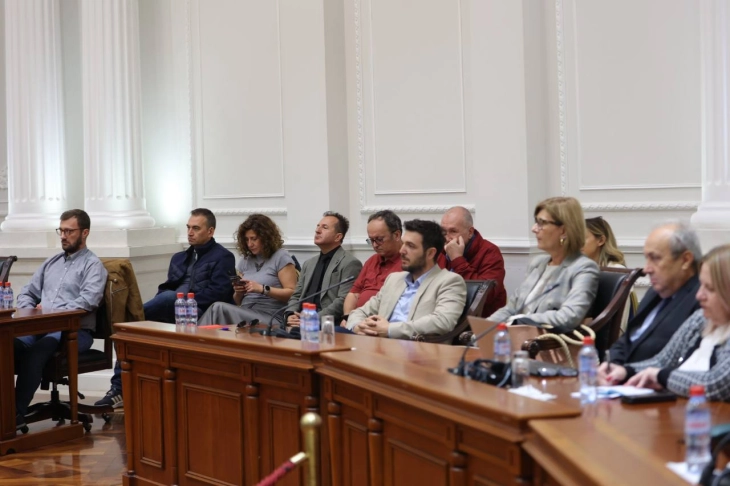State begins drafting national ICT strategy, to track digital transformation progress
- A workgroup has started drafting the national strategy for information, communication, and telecommunication development. The ICT strategy will be the foundation and systematic plan for the country's digitization, and its final version is expected to be ready for adoption during the first half of 2025, Prime Minister and National Council for Digital Transformation chair Hristijan Mickoski told a press conference Wednesday.

Skopje, 16 October 2024 (MIA) - A workgroup has started drafting the national strategy for information, communication, and telecommunication development. The ICT strategy will be the foundation and systematic plan for the country's digitization, and its final version is expected to be ready for adoption during the first half of 2025, Prime Minister and National Council for Digital Transformation chair Hristijan Mickoski told a press conference Wednesday.
Mickoski said the workgroup for the development of the national ICT strategy held its first meeting today. The strategy, he said, would be based on digital infrastructure development, promoting digital skills to citizens, modernizing public services and providing support for digital transformation of businesses, innovation, and entrepreneurship. The goal is to create a complete digital ecosystem.
According to him, the national ICT strategy is a key document that will head all efforts and activities on digital transformation, and will measure all progress and achievements in this field.
"It is necessary to keep up pace in a world that advances at a tremendous speed. Access to digital technologies, their implementation in the interest of people, and their use opens up new horizons and perspectives for all. It is important to understand that digitization is not a monolith, but encompasses various complex, mutually intertwined, and complementary steps. To tread the right path it's important to know our starting point, and how to get to our destination. A careful, comprehensive, and structural approach is a key prerequisite for digital transformation, and consequently, social development in line with global trends," Mickoski stressed.
He added that digital transformation would serve citizens, and its top priority will be to provide accessible and efficient services in the fight against corruption through digitization.
"The workgroup tasked with drafting the national strategy held its first meeting today, which is one of the first activities of the National Council for Digital Transformation, which I chair. This illustrates the Government's commitment to society's digital transformation. Our approach is conscientious and responsible. We think and act long-term, systematically, and by planning, not ad hoc; in cooperation with the expert and scientific community, civil and business sector, and chambers," Mickoski said.
Digitization, he added, is a key tool in the fight against corruption, because automation of processes helps reduce external influences and subjectivity.
Minister of Digital Transformation Stefan Andonovski said the country was not using all the possibilities of information and communication technologies.
"This has resulted in our country falling behind other EU member-states in the digital sphere. That is why this strategy is key. It will be our roadmap for overcoming this obstacle. Unfortunately, for seven years, the country operated without a national strategy for a sector that is supposed to continuously be developing, the basis for the country's economic progress. The new national ICT strategy will be the pillar and systematic plan of Macedonia's digitization," Andonovski said.
He said the goal was to be in line with EU, following directions of the European digital decade by 2030.
"We are ambitious, but realistic. We know there are numerous challenges ahead of us from the need for digital infrastructure, improving citizens' digital skills, to providing electronic digital services to citizens. The drafting process will be inclusive and transparent," Andonovski said.
More than 50 representatives of dozens of institutions, economic chambers, universities, and the non-government sector are included in the workgroup.
The minister invited everyone to take part in drafting the strategy, including state institution experts, creatives from the start-up community, professors, and civil activists.
"We have one goal: To create a complete digital ecosystem that benefits citizens. The strategy will define a concrete set of measures, precise deadlines, activity managers, and measurable results. In the coming months we will form sub-groups for the different pillars, and open channels for gathering ideas. The goal is to have a final version of the national ICT strategy that can be adopted during the first half of 2025," Andonovski said.
The national ICT strategy is supposed to outline solutions to existing issues in the country.
"First we must determine our ICT structure, upgrade it, improve it, and then determine the digital skills of citizens and administration that will use the ICT infrastructure, offer services to citizens through electronic tools, and then assist the digitization process of businesses through innovation and entrepreneurship, and building new technologies. The goal is for all 1,100 institutions in the country to be connected to and communicate through the platform for interoperability," Andonovski added. ssh/mr







